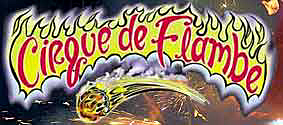Cirque Du Soleil Appeals TTAB's "CIRQUE DE FLAMBE" Ruling
The Dream Merchant Co. has appealed (CAFC Appeal No. 05-1174, docketed January 11, 2005) from the TTAB's decision dismissing its opposition in Dream Merchant Co. v. Fremonster Theatrical, Opposition No. 91152686 (June 17, 2004) [not citable], reconsideration denied (September 28, 2004). Dream Merchant sought to block registration, on the grounds of likelihood of confusion and dilution, of the mark CIRQUE DE FLAMBE for "entertainment in the nature of circuses" (CIRQUE disclaimed), relying on its registered mark CIRQUE DU SOLEIL for entertainment and theatrical services. But a major procedural snag disrupted its effort.

Applicant Fremonster, after its first attempt at an answer to the Notice of Opposition was rejected by the Board, filed an acceptable answer on December 10, 2002, accompanied by the following request:
"We are seeking legal counsel to continue this application and we will hopefully, be presenting an attorney soon, to take over our application process. If we can request a 30-day extension to this filling or the next filling [sic], we wish to do so now, to allow any new attorney to catch up on the issues involved."Nothing happened in the case until after testimony periods had closed (on August 15, 2003). The Board issued an order on February 10, 2004, allowing Dream Merchant to show cause why its failure to file a brief should not be treated as a concession of the case under Trademark Rule 2.128(a)(3). Opposer filed a response together with a motion to re-open discovery and testimony, stating that its failure to take testimony and submit a brief was the result of its "reliance on applicant's explicit request for an extension of time to file an answer and obtain counsel," and on its "good faith belief that applicant had not submitted a proper answer . . . and was planning on abandoning its mark."
The Board lifted the show cause order (i.e., concluding that Opposer had not lost interest in the case), but ruled that Dream Merchant failed to meet the FRCP Rule 6(b)(2)standard for re-opening discovery and testimony: namely, excusable neglect. In that connection, it applied the Supreme Court's four-factor test set out in Pioneer Inv. Serv. Co. v. Brunswick Assoc. Ltd., 507 U.S. 380 (1993).
The Board disagreed with Dream Merchant's characterization of Fremonster's request as an "explicit" extension request for additional time to file its answer. "Instead, a more logical reading of this cover letter is that applicant is requesting additional time to find legal counsel, and making a contingent request that, if any other filing deadline should be imminent that it be extended." The Board pointed out that, during the one year period between close of discovery and Opposer's response to the show cause order, "opposer could have inquired as to the status of this case." It concluded that even if Fremonster "will not be substantially prejudiced" by the delay and even if opposer acted in good faith, those two factors did not overcome the two that are not in Dream Merchant's favor (the length of and reason for the delay).

The Board then turned to the merits of the case -- the record consisting of the pleadings and Applicant's file history. Fremonster admitted that Dream merchant is owner of the pleaded registrations, that Opposer has priority, and that the mark CIRQUE DE SOLEIL is famous and was famous prior to Fremonster's claimed first use date.
With regard to the likelihood of confusion claim, the Board deemed the services to be identical and the CIRQUE DU SOLEIL mark entitled to a broad scope of protection. Nonetheless, the Board found the differences in the marks to be the critical du Pont factor: because the word "cirque" is descriptive or generic for the involved services, the two marks are dominated by the phrases "de flambe" and "du soleil," respectively, which phrases differ in sound, appearance, and meaning. The Board therefore ruled that confusion is not likely.
As to Opposer's dilution claim, the Board found it unnecessary to answer what is perhaps the major unresolved issue in TTAB dilution jurisprudence: what standard applies when the accused mark is already in use: likelihood of dilution or actual dilution? Dream Merchant had no proof of record regarding "any blurring or tarnishment or any sort of lessening of the distinctiveness of plaintiff's famous mark." Thus if an actual dilution standard applied, Opposer's claim would fail. The Board observed, however, that the marks at issue are clearly not "virtually identical," as required for a plaintiff to prevail on a TTAB dilution claim. Consequently, Dream Merchant's Section 43(c) claim would fail regardless of which standard applied, and there was no need to answer the unanswered question.
The TTABlog notes that this case is an unfortunate example of the TTAB's typically rigid stance in the face of a party's innocent failure to adhere to the Board's scheduling order. This form-over-substance approach flies in the face of the Board's professed desire to decide cases on the merits rather than on procedural niceties. The Board's emphasis on a party's prompt action in seeking to re-open a case stands in ironic contrast with the Board's frequent tardiness in deciding matters. Let's face it, the TTAB is not a "rocket docket."
In this writer's view, Dream Merchant should have been afforded the opportunity to put in all of its evidence so that a decision could be made on a full record. There was no proof of any prejudice to Applicant due to the delay, and the Board apparently accepted Opposer's assertion of good faith. Shouldn't those two factors be the important ones in the Pioneer analysis?
Text ©John L. Welch 2005. All Rights Reserved.




0 Comments:
Post a Comment
<< Home